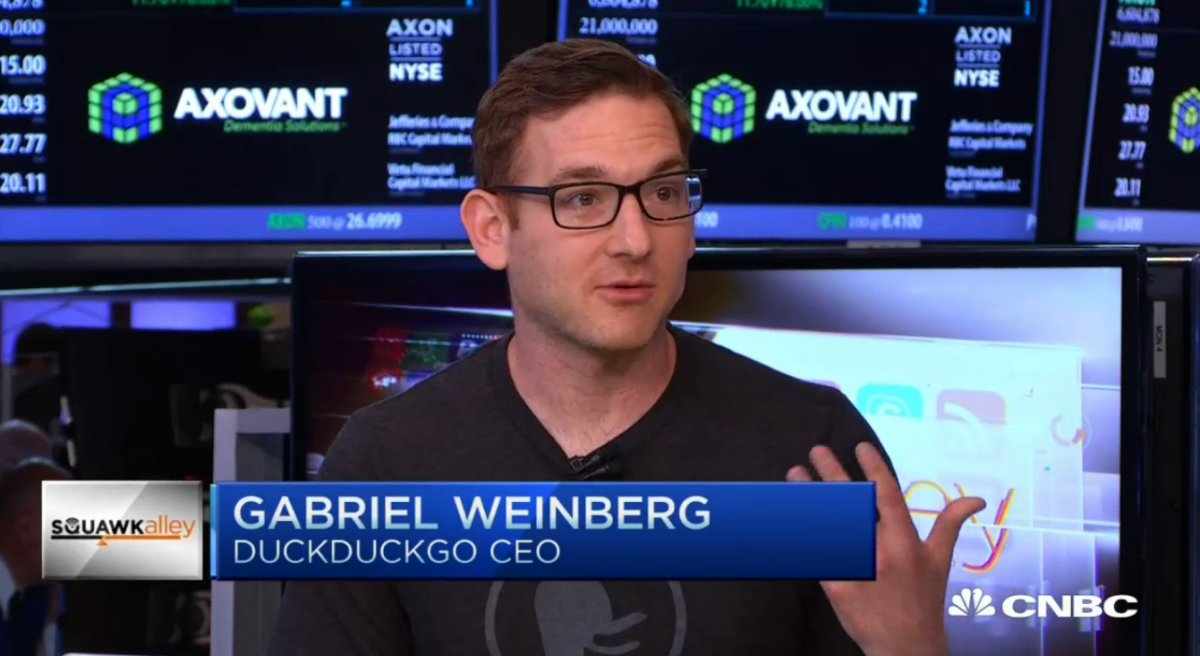As the conflict between Russia and Ukraine has continued to intensify over the last few weeks, misinformation has percolated throughout online spaces.
Misinformation, which uses false information to deliberately mislead or deceive, is nearly a constant in 2022. It was a pivotal part of the 2016 and 2020 elections, has played into the spread of COVID-19, and is running rampant as Europe sees its biggest conflict since World War II.
And on Wednesday, Gabe Weinberg, CEO of Paoli-headquartered, privacy-focused internet browser DuckDuckGo, announced on Twitter the company was doing something about it. In a short thread, he explains that the company stands with Ukrainians, and has rolled out “search updates that down-rank sites associated with Russian disinformation.” The company also continues to place news modules and information boxes at the top of its search results that highlight “quality information” for quickly unfolding topics.
https://twitter.com/yegg/status/1501716484761997318
The reaction from users was swift, and mixed. While some called the move political or attempted censorship, others praised the step toward prioritizing verified information.
just so you understand, this is not a good look for @DuckDuckGo which was marketed as pro-privacy and no political tweaking. you can be anti Ukraine invasion without attempting to censoring/filter out information. the answer to bad info is more info. be better.
— Adam Back (@adam3us) March 10, 2022
This is a bad idea. If you are true to your mission you should NOT interfere with search. https://t.co/AQlU9RlngA
— Clint Olsen (@clintolsen) March 11, 2022
https://twitter.com/davywtf/status/1501819661368926216
People commenting here don't seem to understand that to make a search engine _useful_ you need to filter, rank, massage, order results. There is no objective "right" or "unbiased" way to do this, it's all subjective choices. You are kidding yourself if you think otherwise
— Nick Williams (@WickyNilliams) March 10, 2022
While neither Weinberg nor a DuckDuckGo spokesperson Technical.ly got in touch with on Friday outlined the technical changes made for the “down-ranking,” the spokesperson said this:
“Search engines by definition put relevant higher quality sites over lower ones for every search,” she said. “This isn’t censorship, it’s just search rankings. DuckDuckGo is not censoring results. We are simply using the fact that these sites are engaging in active disinformation campaigns as a ranking signal that the content they produce is of lower quality, just like there are signals for spammy sites and other lower-quality content.”
“Current examples are Russian state-sponsored media sites like RT and Sputnik,” the spokesperson added. “In addition to this approach, for newsworthy topics we’re also continuing to highlight reputable news coverage and reliable ‘instant answers’ at the top of our search results where they are seen and clicked the most. We’re also in the process of thinking about other types of interventions.”
It’s not the first time DuckDuckGo has made changes to its search results before. A decade ago, Weinberg said he was shutting down content farms.
“The goal from the beginning was to remove useless sites,” Weinberg told WebProNews then. “Made for AdSense (MFA) sites are in this category, i.e. sites with zero or very little content and lots of ads everywhere. These we try to ban algorithmically by detection via crawling the Web.”
On Technical.ly’s public Slack, technologists jumped into the conversation pretty quickly. Claude Schrader, an operations engineer at Azavea, said he’s a long time DuckDuckGo user.
“Fallout from misinformation is responsible for … quite a lot in the past decade or so, so I see it as an unfortunate good thing,” Schrader said. “It is tricky to do right though, so I am curious about how they decide what gets downgraded.”
Crossbeam Engineering Manager Nick McAvoy agreed there was more to be learned about the technical aspect of “down-ranking.” Also a longtime user, McAvoy said the change doesn’t rile him up too much, but he feels like the company could be “straying” from its original mission (which, as a reminder, started by adhering to a tracker-free privacy standard, blocking ad-tracking cookies and keeping users’ search history private).
https://twitter.com/yegg/status/1501733167291674627
“I think a search engine’s job is to help people find what they are looking for. Yes, that means finding heuristics for identifying poor quality sources of information. PageRank was an absolute breakthrough in this regard,” McAvoy said. “The question is how do ‘neutral’ processes like this produce an inferior product full of untrue information that happens to be from Russian sources?”
It’s yet to be determined if Weinberg or the company will put out further explanation of its ranking system, though calls for transparency continue to roll in. Per fractional CTO Nico Westerdale — who threw out another request for more info from DuckDuckGo on Slack Friday — there’s a difference between something being factually false and just a different point of view.
“I would hope that DDG holds their users in high enough regard to share this information,” he said. “That would go a long way in resolving these issues where we simply don’t know which search results are being down-ranked and which are not.”
Before you go...
Please consider supporting Technical.ly to keep our independent journalism strong. Unlike most business-focused media outlets, we don’t have a paywall. Instead, we count on your personal and organizational support.
Join our growing Slack community
Join 5,000 tech professionals and entrepreneurs in our community Slack today!

Entrepreneurship is changing, and so is the economic development behind it

Tech Hubs’ new $210M funding leaves Baltimore and Philly off the table

Here’s what to know before using AI to craft your brand’s social media posts


